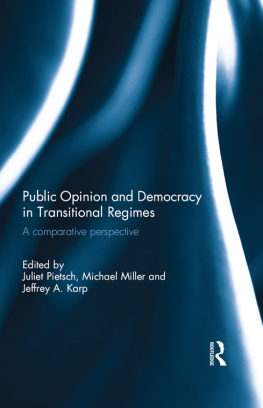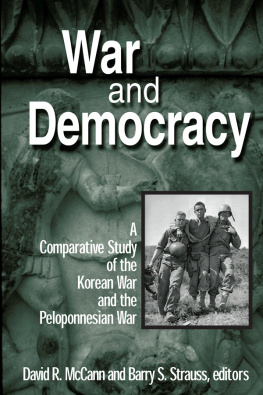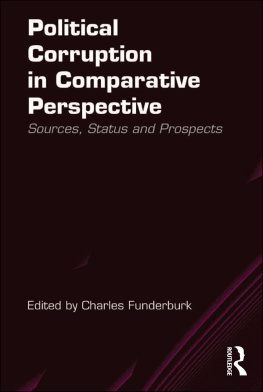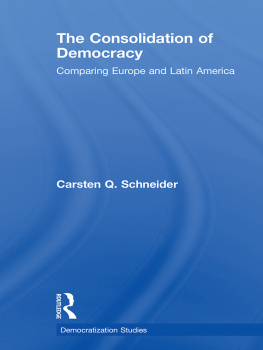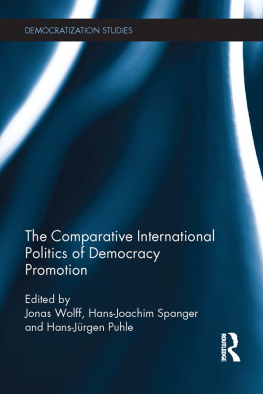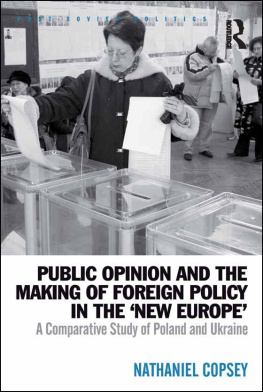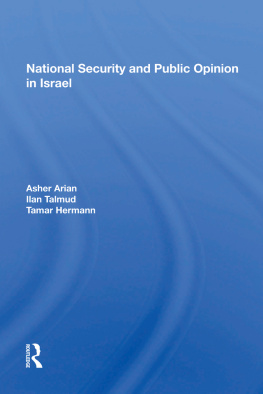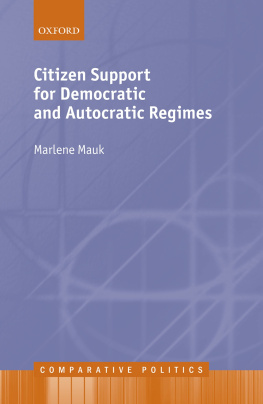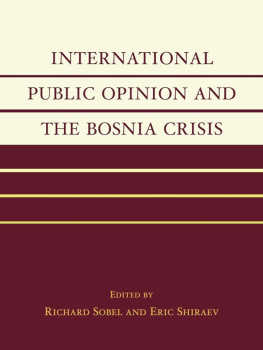Public Opinion and Democracy in Transitional Regimes
Despite the enthusiasm surrounding the Colour Revolutions and the Arab Spring, the worlds share of democracies has stagnated over the past 15 years. The steady rise of China, Russia, and Iran has also led to warnings of a resurgence of authoritarian great powers, especially in light of the financial crisis centred in the USA and Western Europe. On the positive side, however, democracy remains remarkably popular as an ideal. In the Global barometers most recent survey, two out of three respondents say democracy is their most favoured political system, including a majority in 49 of the 55 countries. Yet there is evidence, much expanded upon in this edited collection, that commitments to liberal democracy in practice are not as strong. Nominally pro-democratic citizens frequently favour limitations on electoral accountability and individual rights in the service of improved governance or economic growth. Further, there are rising concerns that many citizens, especially across the developing world, are turning away from democracy out of frustration with democratic performance. In contrast to many transitional regimes, the more established democracies appear to be losing support among their highly educated citizens. The contributions in this edited collection compare how democracy is understood and experienced in transitioning regimes and established democracies.
This book was originally published as a special issue of the Journal of Elections, Public Opinion and Parties.
Juliet Pietsch is an Associate Professor of Political Science at the Australian National University.
Michael Miller is an Assistant Professor of Political Science at George Washington University.
Jeffrey A. Karp is a Professor of Political Science at the University of Exeter.
Public Opinion and Democracy in Transitional Regimes
A comparative perspective
Edited by
Juliet Pietsch, Michael Miller and Jeffrey A. Karp
First published 2016
by Routledge
2 Park Square, Milton Park, Abingdon, Oxon, OX14 4RN, UK
and by Routledge
711 Third Avenue, New York, NY 10017, USA
Routledge is an imprint of the Taylor & Francis Group, an informa business
2016 Elections, Public Opinions and Parties (EPOP)
All rights reserved. No part of this book may be reprinted or reproduced or utilised in any form or by any electronic, mechanical, or other means, now known or hereafter invented, including photocopying and recording, or in any information storage or retrieval system, without permission in writing from the publishers.
Trademark notice: Product or corporate names may be trademarks or registered trademarks, and are used only for identification and explanation without intent to infringe.
British Library Cataloguing in Publication Data
A catalogue record for this book is available from the British Library
ISBN 13: 978-1-138-12487-5
Typeset in Times
by RefineCatch Limited, Bungay, Suffolk
Publishers Note
The publisher accepts responsibility for any inconsistencies that may have arisen during the conversion of this book from journal articles to book chapters, namely the possible inclusion of journal terminology.
Disclaimer
Every effort has been made to contact copyright holders for their permission to reprint material in this book. The publishers would be grateful to hear from any copyright holder who is not here acknowledged and will undertake to rectify any errors or omissions in future editions of this book.
Contents
Juliet Pietsch, Michael Miller & Jeffrey A. Karp
Doh Chull Shin
Juliet Pietsch
Howard Sanborn
Graeme Gill
Ian McAllister & Stephen White
Jeffrey A. Karp & Caitlin Milazzo
The chapters in this book were originally published in the Journal of Elections, Public Opinion and Parties, volume 25, issue 1 (February 2015). When citing this material, please use the original page numbering for each article, as follows:
Public Support for Democracy in Transitional Regimes
Juliet Pietsch, Michael Miller & Jeffrey A. Karp
Journal of Elections, Public Opinion and Parties, volume 25, issue 1 (February 2015) pp. 19
Cultural Hybridization in East Asia: Exploring an Alternative to the Global Democratization Thesis
Doh Chull Shin
Journal of Elections, Public Opinion and Parties, volume 25, issue 1 (February 2015) pp. 1030
Authoritarian Durability: Public Opinion towards Democracy in Southeast Asia
Juliet Pietsch
Journal of Elections, Public Opinion and Parties, volume 25, issue 1 (February 2015) pp. 3146
Democratic Consolidation: Participation and Attitudes Toward Democracy in Taiwan and South Korea
Howard Sanborn
Journal of Elections, Public Opinion and Parties, volume 25, issue 1 (February 2015) pp. 4761
The Stabilization of Authoritarian Rule in Russia?
Graeme Gill
Journal of Elections, Public Opinion and Parties, volume 25, issue 1 (February 2015) pp. 6277
Electoral Integrity and Support for Democracy in Belarus, Russia, and Ukraine
Ian McAllister & Stephen White
Journal of Elections, Public Opinion and Parties, volume 25, issue 1 (February 2015) pp. 7896
Democratic Scepticism and Political Participation in Europe
Jeffrey A. Karp & Caitlin Milazzo
Journal of Elections, Public Opinion and Parties, volume 25, issue 1 (February 2015) pp. 97110
For any permission-related enquiries please visit: http://www.tandfonline.com/page/help/permissions
JULIET PIETSCH*, MICHAEL MILLER** & JEFFREY A. KARP*
*School of Politics and International Relations, Australian National University; **Department of Political Science, The George Washington University
Introduction
Despite the enthusiasm surrounding the Colour Revolutions and the Arab Spring, the worlds share of democracies has stagnated over the past 15 years. The steady rise of China, Russia, and Iran has also led to warnings of a resurgence of authoritarian great powers, especially in light of the financial crisis centred in the USA and Western Europe (Gat, 2007; Plattner, 2011). On the positive side, however, democracy remains remarkably popular as an ideal. In the Global barometers most recent survey, two out of three respondents say democracy is their most favoured political system, including a majority in 49 of the 55 countries. Yet there is evidence, much expanded upon in this issue, that commitments to liberal democracy in practice are not as strong (Carlson & Turner, 2009; Krastev, 2007; Shin & Wells, 2005). Nominally pro-democratic citizens frequently favour limitations on electoral accountability and individual rights in the service of improved governance or economic growth. Further, there are rising concerns that many citizens, especially across the developing world, are turning away from democracy out of frustration with democratic performance (Chang et al., 2007; Kurlantzick, 2013).
A particular challenge to democracy has been the spread and resilience of dictatorships that adopt traditionally democratic institutions, such as legislatures, independent courts, and elections (Diamond, 2002; Gandhi, 2008; Levitsky & Way, 2010; Magaloni, 2006). China, Russia, and Iran, for instance, all feature legislatures (albeit of varying strength) and contested elections (although for China only at the local level). The image of these countries as transitional countries steadily moving towards democracy has long faded (Carothers, 2002), producing a large literature on the sources of stability within these transitional regimes (Gandhi & Lust-Okar, 2009; Magaloni, 2006). For the most part, scholars have focused on the use of quasi-democratic institutions to maintain elite coalitions (Brownlee, 2007; Gandhi, 2008; Magaloni, 2006) and to generate popular support through clientelistic linkages (Blaydes, 2011; Lust-Okar, 2006).


